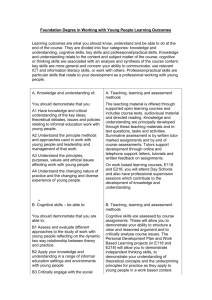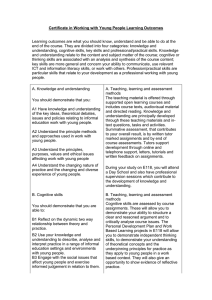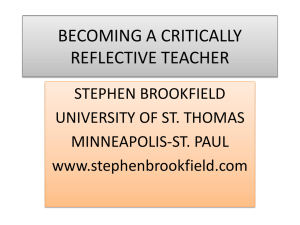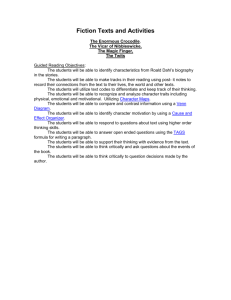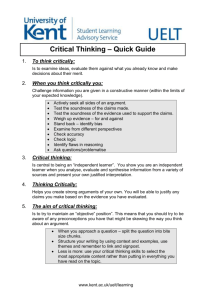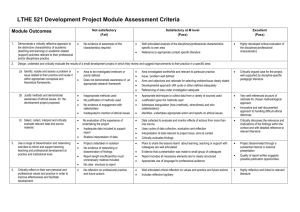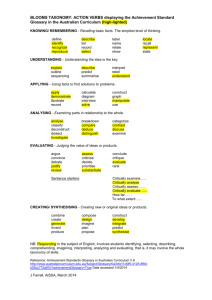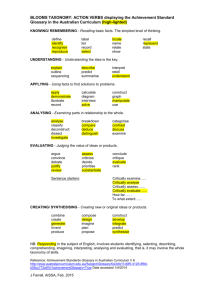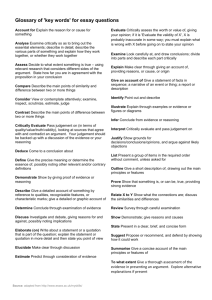BA (Honours) Working with Young People Learning Outcomes
advertisement
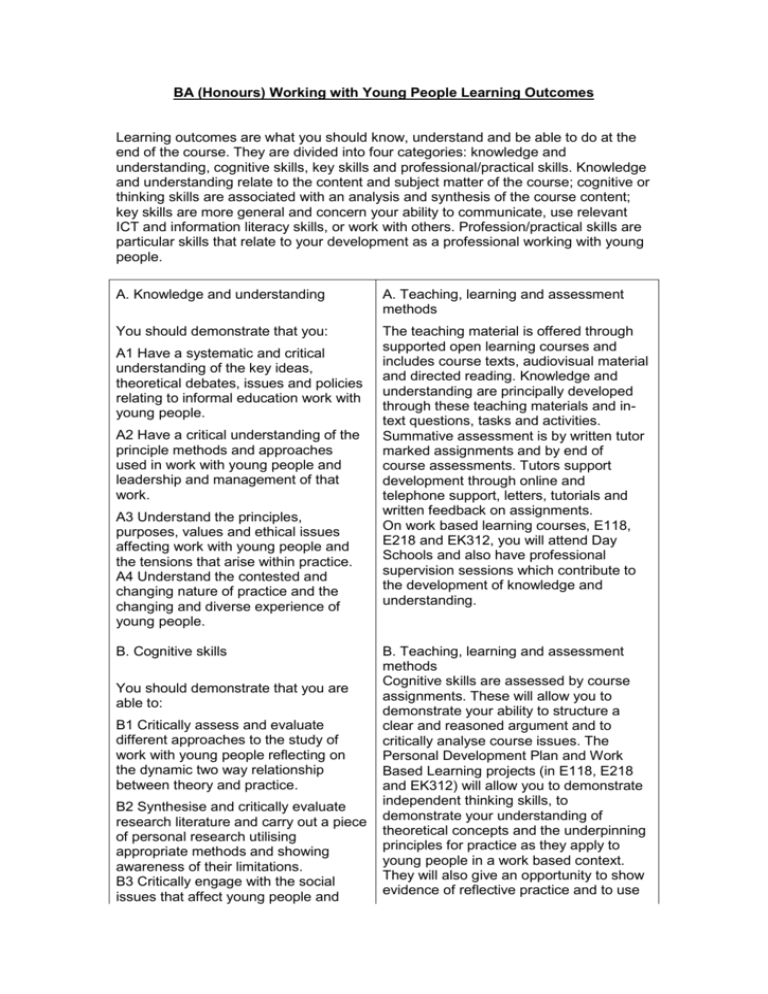
BA (Honours) Working with Young People Learning Outcomes Learning outcomes are what you should know, understand and be able to do at the end of the course. They are divided into four categories: knowledge and understanding, cognitive skills, key skills and professional/practical skills. Knowledge and understanding relate to the content and subject matter of the course; cognitive or thinking skills are associated with an analysis and synthesis of the course content; key skills are more general and concern your ability to communicate, use relevant ICT and information literacy skills, or work with others. Profession/practical skills are particular skills that relate to your development as a professional working with young people. A. Knowledge and understanding A. Teaching, learning and assessment methods You should demonstrate that you: The teaching material is offered through supported open learning courses and includes course texts, audiovisual material and directed reading. Knowledge and understanding are principally developed through these teaching materials and intext questions, tasks and activities. Summative assessment is by written tutor marked assignments and by end of course assessments. Tutors support development through online and telephone support, letters, tutorials and written feedback on assignments. On work based learning courses, E118, E218 and EK312, you will attend Day Schools and also have professional supervision sessions which contribute to the development of knowledge and understanding. A1 Have a systematic and critical understanding of the key ideas, theoretical debates, issues and policies relating to informal education work with young people. A2 Have a critical understanding of the principle methods and approaches used in work with young people and leadership and management of that work. A3 Understand the principles, purposes, values and ethical issues affecting work with young people and the tensions that arise within practice. A4 Understand the contested and changing nature of practice and the changing and diverse experience of young people. B. Cognitive skills You should demonstrate that you are able to: B1 Critically assess and evaluate different approaches to the study of work with young people reflecting on the dynamic two way relationship between theory and practice. B2 Synthesise and critically evaluate research literature and carry out a piece of personal research utilising appropriate methods and showing awareness of their limitations. B3 Critically engage with the social issues that affect young people and B. Teaching, learning and assessment methods Cognitive skills are assessed by course assignments. These will allow you to demonstrate your ability to structure a clear and reasoned argument and to critically analyse course issues. The Personal Development Plan and Work Based Learning projects (in E118, E218 and EK312) will allow you to demonstrate independent thinking skills, to demonstrate your understanding of theoretical concepts and the underpinning principles for practice as they apply to young people in a work based context. They will also give an opportunity to show evidence of reflective practice and to use exercise informed judgement in relation to them. appropriate methods of enquiry – for example in EK312 where you will carry out a practical research project with young people. C. Key skills C. Teaching, learning and assessment methods You should demonstrate that you are able to: Key skills are promoted within learning materials and as part of continuous assessment. Assessment criteria of assignments require you to demonstrate your ability to communicate effectively and appropriately in a variety of formats. Learning skills focusing on information literacy, setting priorities and targets and self assessment are a feature of the Personal Development Plan, the general approach to key skills and of the work based learning components. You are encouraged to use on-line forums to communicate with tutors and other students throughout the award and use of ICT will be a requirement of the delivery and support process for the work based learning courses (E118, E218 and EK312). Opportunities to develop personal ICT skills are a component of the work based learning courses. C1 Communicate complex information, arguments and ideas effectively and appropriately using diverse media and to diverse audiences C2 Find, critically evaluate and use information or data accurately in complex contexts C3 Select and use ICT tools to improve your learning and to contribute to your community of practice C4 As an independent leaner, plan, monitor and evaluate your learning and seek ways to improve your performance D. Practical and/or professional skills D. Teaching, learning and assessment methods You should demonstrate that you are able to: Professional skills are developed as part of an increased awareness and understanding of good practice and through understanding and undertaking a reflective practice approach. The assessment of practice skills is via course work, participation in Day Schools (or equivalent) and assessed observed practice. This includes developing an appropriate approach to recording development in relation to work based practice. Students also develop a Personal Development Plan throughout the award. D1 Operate as a reflective practitioner working with young people, recognising and managing complex situations and applying ethical principles and anti oppressive practice as appropriate. D2 Design, lead, implement and evaluate activities, programmes and projects which support young peoples’ development and learning. D3 Critically apply the research, analytical and evaluative skills needed for effective practice and the promotion of equality across working with young people. D4 Work in partnership and in teams ensuring an environment that values other professionals and supports the development of self and colleagues.
